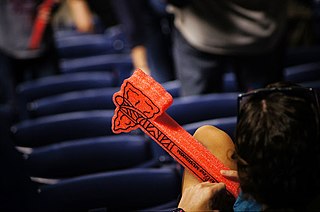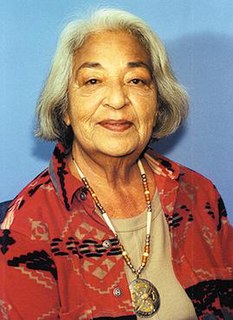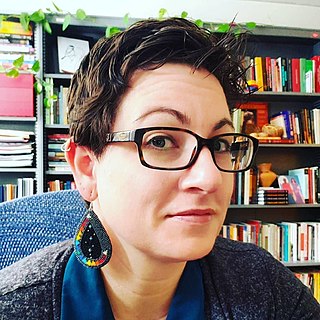
Indigenous peoples in Brazil or Indigenous Brazilians once comprised an estimated 2000 tribes and nations inhabiting what is now the country of Brazil, prior to the European contact around 1500. Christopher Columbus thought he had reached the East Indies, but Portuguese Vasco da Gama had already reached India via the Indian Ocean route, when Brazil was colonized by Portugal. Nevertheless, the word índios ("Indians") was by then established to designate the people of the New World and continues to be used in the Portuguese language to designate these people, while a person from India is called indiano in order to distinguish the two.

Lee Maracle, is a Sto:lo poet and author from Canada. She speaks out as a critic of the treatment of Indigenous people by the Canadian state, and she particularly highlights the issues relating to Indigenous women.
The Society for the Study of the Indigenous Languages of the Americas (SSILA) is an international organization founded in 1981 devoted to the study of the indigenous languages of North, Central, and South America.

The Indigenous peoples of the Americas are the inhabitants of the Americas before the arrival of the European settlers in the 15th century, and the ethnic groups who now identify themselves with those peoples.
The Native American name controversy is an ongoing discussion about the changing terminology used by the Indigenous peoples of the Americas to describe themselves, as well as how they prefer to be referred to by others. Preferred terms vary primarily by region and age. As Indigenous peoples and communities are diverse, there is no consensus on naming, aside from the fact that most people prefer to be referred to by their specific nations.
The Society of Biblical Literature (SBL), founded in 1880 as the Society of Biblical Literature and Exegesis, is an American-based learned society dedicated to the academic study of the Bible and related ancient literature. Its current stated mission is to "foster biblical scholarship". Membership is open to the public and consists of over 8,300 individuals from over 100 countries. As a scholarly organization, SBL has been a constituent society of the American Council of Learned Societies since 1929.
The Association for Asian Studies (AAS) is a scholarly, non-political and non-profit professional association open to all persons interested in Asia and the study of Asia. It is based in Ann Arbor, Michigan, United States. With approximately 6,000 members worldwide, from all the regions and countries of Asia and across academic disciplines, the AAS is the largest organization focussing on Asian studies.

LaDonna Vita Tabbytite Harris is a Comanche Native American social activist and politician from Oklahoma. She is the founder and president of Americans for Indian Opportunity. Harris was a vice presidential candidate for the Citizens Party in the 1980 United States presidential election alongside Barry Commoner. She was the first Native American woman to run for vice president. In 2018, she became one of the inductees in the first induction ceremony held by the National Native American Hall of Fame.
LeAnne Howe is an American author and Eidson Distinguished Professor in the Department of English at the University of Georgia, Athens. She previously taught American Indian Studies and English at the University of Minnesota and at the University of Illinois at Urbana-Champaign and is a member of the Choctaw Nation of Oklahoma.
The National Humanities Center (NHC) is an independent institute for advanced study in the humanities. The NHC operates as a privately incorporated nonprofit and is not part of any university or federal agency. The center was planned under the auspices of the American Academy of Arts and Sciences, which saw a need for substantial support for academic research in the humanities, and began operations in 1978.

The University of Minnesota Press is a university press that is part of the University of Minnesota. It had annual revenues of just over $8 million in FY 2018.

Since the 1960s, the issue of use of Native American and First Nations names for sports teams or mascots has been the subject of increasing public controversy in the United States and Canada. This has been a period of rising indigenous civil rights movements, and Native Americans and their supporters object to the use of images and names they consider derogatory. They have conducted numerous protests and tried to educate the public on this issue.
The American Indian Library Association (AILA) is an affiliate of the American Library Association (ALA), and is a membership action group that focuses on the library-related needs of American Indians and Alaska Natives. The organization's members consist of both individuals and institutions that are interested in improving library services to Native American people in any type of library in the United States.
Elizabeth Woody is an American Navajo/Warm Springs/Wasco/Yakama artist, author, and educator. In March 2016, she was the first Native American to be named poet laureate of Oregon by Governor Kate Brown.

Two-Spirit is a modern, pan-Indian, umbrella term used by some Indigenous North Americans to describe Native people in their communities who fulfill a traditional third-gender ceremonial and social role in their cultures.

Patricia A. Locke was a Native American educator, activist, and prominent member of the Baháʼí Faith. She worked closely with indigenous activists in supporting the American Indian Religious Freedom Act. After joining the Baháʼí Faith in 1988, she was elected as the first Native American woman to serve on the National Spiritual Assembly of the Baháʼís of the United States. In 1991 she was a MacArthur Fellow, represented the US National Baháʼí community in Beijing at the Fourth World Conference on Women, and she was honored with the Indigenous Language Institute's Those Who Make a Difference award in 2001 just before her death. Posthumously she was inducted into the National Women's Hall of Fame in 2006, and in 2014 was a National Race Amity Conference honoree of a Race Amity Medal of Honor and the Google Cultural Institute included her in its listing Showcasing Great Women. Her son is renowned hoop dancer, flute player, and storyteller Kevin Locke.
Studies in American Indian Literatures is a biannual peer-reviewed academic journal covering Native American literature. It is published by the University of Nebraska Press on behalf of the Association for the Study of American Indian Literatures.

Laltluangliana Khiangte is a Mizo academic, playwright and poet of Mizo literature. He was the principal of the Serampore College and a former professor at Pachhunga University College and the North Eastern Hill University. He presently served as the senior most professor in the Department of Mizo at Mizoram University. He is a recipient of the Pu Buanga Award, the highest literary award of the Mizo Academy of Letters. The Government of India awarded him the fourth highest civilian honour of the Padma Shri, in 2006, for his contributions to Indian literature.
Inés M. Talamantez was an ethnographer and scholar of religion. She was professor of religious studies at University of California, Santa Barbara (UCSB). She was an expert on Native American religion and philosophy.

Jenny L. Davis is an American linguist and anthropologist. She is an Associate Professor of Anthropology, American Indian Studies, and Gender & Women's Studies at the University of Illinois at Urbana–Champaign where she is the director of the American Indian Studies Program. Her research is on contemporary Indigenous languages and identity, focusing on Indigenous language revitalization and Indigenous gender and sexuality, especially within the Two-Spirit movement.










